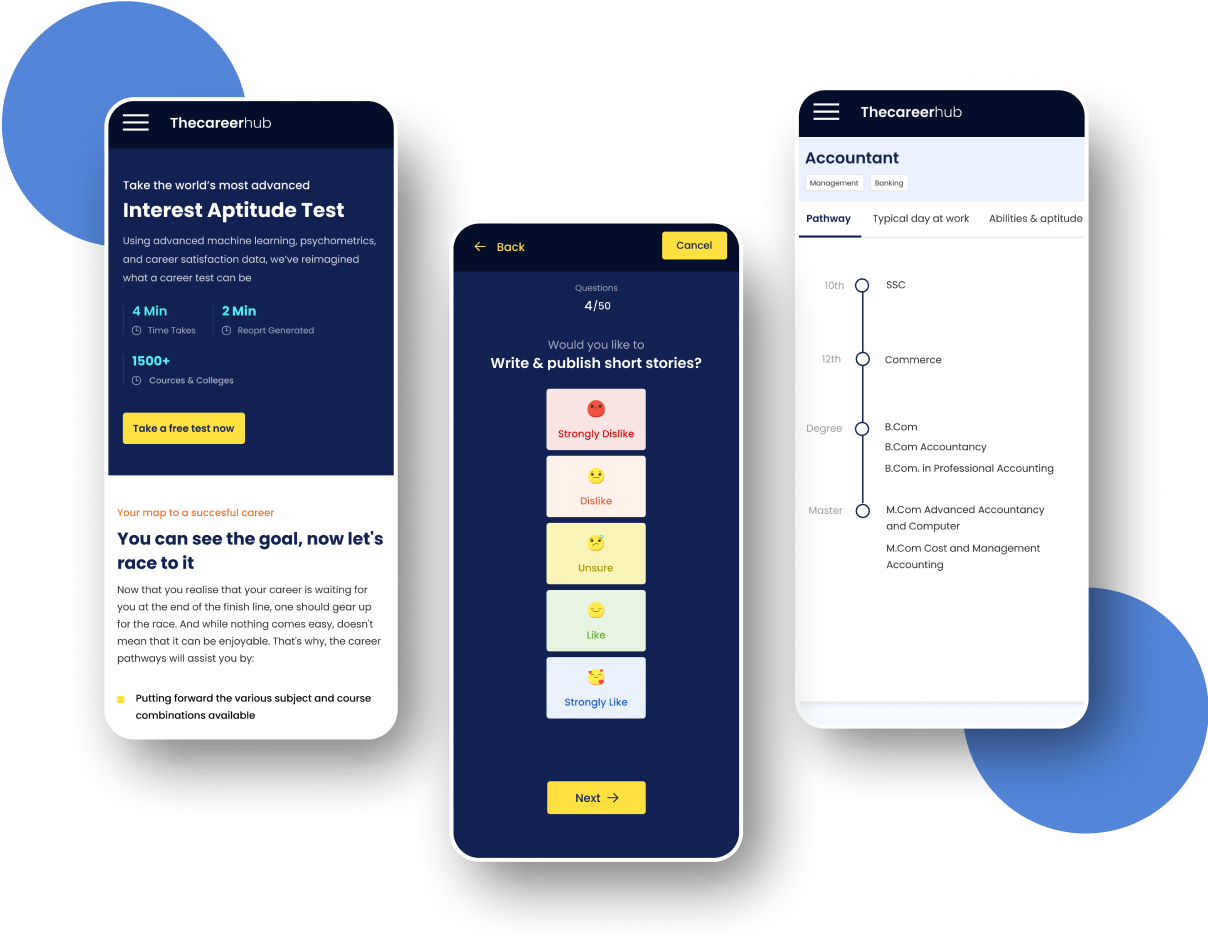What is Aptitude?
Aptitude refers to your natural ability to complete a variety of tasks. Aptitude refers to your natural ability or capacity to learn, as well as your habits and dispositions. Your aptitudes are the ease with which you can pick up new abilities, whether natural or taught. When we say you have a high aptitude for talent, we're referring to your ability to learn and perform a skill. Such abilities can be used to forecast a child's future performance. Aptitude is something that comes easily to you or that you may develop without any effort. When looking for a new job or considering a career shift, knowing your strengths is critical since it will properly point you. It will be more pleasurable to work in occupations that demand your skills.
What is an Aptitude Test in Agartala?
The Aptitude Test in Agartala is a tool for assessing one's abilities and interests, whether they are established or emerging. Aptitude tests are important in determining the correct career to pursue and in preparing for it. The online aptitude test & Psychometric Test is the most frequent and time-tested assessment used throughout the academic year and for company management.
A career aptitude exam can assist you in understanding the link or relationship between your cognitive abilities, career sectors, and work performance. The aptitude test will always provide a profile that reveals one's strengths as well as areas in which more growth is required.
In Agartala, an aptitude test is a common approach to establish a person's suitability for a certain profession. As a result, aptitude tests are administered to persons who are considering a career change or who want to better their existing one. As a result, everyone is encouraged to take the aptitude test, and it serves as a data point for career planning and execution through career counselling.
Standardised aptitude testing is now much easier to get by. Kids in Agartala may take an online aptitude test, and the results will be accessible in minutes, and they will be free of human error and bias.
Benefits of Aptitude Test in Agartala
- Aptitude tests are commonly used to assess candidates for specialised college courses, professional degrees (such as business and law), and recruiting and employment in certain firms. In any event, extensive examinations can be taken at the school level to track future potential. The following are some of the advantages:
- Prepares you for the career of your dreams.
- Conducts a SWOT Analysis on Your Behalf
- Helps parents, guardians, and mentors understand their children's strengths and interests.
- Ensures that they are aligned with their professional goals.
- Creates solutions for overcoming challenges along the road.
- Informs them of the demands of a certain field.
- Providing Grooming for Educational Purposes
- Provides information on several occupations as well as the educational requirements for each.
As a result, both students and businesses employ aptitude tests for a variety of objectives, including SWOT analysis, topic selection, and career development. The Aptitude Test analyses acquired abilities and talents based on the person's history and normalised results. The outcome does not require one to limit oneself to their skills while still showcasing job options based on strengths. By focusing on all components, it encourages the capacity to keep all professional alternatives open.
When is it appropriate to take an aptitude test?
The Aptitude Test is available in Agartala at Brainwonders career counselling establishments.
One can use it in conjunction with their DMIT Test and IQ Test analysis for advanced mapping (report). When choosing one's future job path, it's generally beneficial to be broad and specific; for the same reason, knowing one's skills, aptitudes, hobbies, and intrinsic traits is critical.
What is the purpose of the Agartala aptitude test?
The aptitude test evaluates the attributes listed below, which may be used to influence personal, social, and professional growth.
- Visualization of Space
- Manipulation and rotation of 2D and 3D forms and objects in the mind.
- Understanding of Numbers
- Calculation and mental arithmetic are examples of math skills.
- Creativity
- To contextualise knowledge, you must be able to think beyond the box and think abstractly.
- Linguistic Proficiency
- Reading comprehension, grammar, and spelling abilities are all assessed.
- Perceptual Accuracy and Speed
- Using the information presented to make basic judgments
- Mechanical Understanding
- Having a rudimentary understanding of technological ideas and principles
What are the different kinds of aptitudes?
1. Verbal Reasoning:
Verbal reasoning is the process of determining a person's comprehension of written material. The verbal reasoning aptitude exam evaluates a person's ability to comprehend, spell, use appropriate grammar, and comprehend words.
- Verbal thinking is frequently evaluated by providing a paragraph or several paragraphs and asking questions about them.
- The test taker is provided with four or five different spellings of the same word or four or five different words in the spelling part, and they must select the one that is correctly spelt.
- The grammar section of the verbal reasoning exam will offer the test taker several assertions and ask them to identify the best grammatically correct sentence.
- Another area deals with understanding words and their meanings. You could be asked to define a phrase or choose a word that is the polar opposite of the highlighted or bolded term.
These questions appear in most general aptitude tests since most vocations require you to either grasp and make decisions based on verbal or written information, or to convey this knowledge to others.
2. Numerical Analysis:
Numerical Reasoning is a skill that incorporates a person's statistical talents. Aptitude tests are used to measure a person's degree of competency-based on their understanding of numbers, number sequences, graphs, tables, and calculations, such as mathematical equations, all of which help to provide a clear picture of Numerical Reasoning.
In other words, basic numeracy is a component of this skill set.
Aptitude tests are directly applicable to a wide range of administrative and clerical occupations, but they may also be found in graduate and management examinations.
More difficult data interpretation and numerical critical thinking problems provide blocks of information that must be manipulated and interpreted.
Employers often want to see some evidence of your ability to deal with numbers, even if it isn't a crucial component of the job, therefore these questions appear on most general aptitude tests.
3. Abstract Reasoning:
Evaluate your ability to consider angles and shapes abstractly. Abstract reasoning and diagrammatic reasoning tests assess the ability to discern a pattern's underlying logic and then decide on a solution.
The ability to think abstractly is regarded to be the most accurate indicator of fluid intelligence and your ability to learn new things quickly.
These aptitude tests are extremely beneficial when hiring people for technical jobs that need them to deal with abstract concepts or ideas. They can also be used to test abstract reasoning abilities.
However, because they are the most comprehensive measure of your general intellectual aptitude, you will almost certainly meet some of these questions in every examination you are given.
4. Inference via Mechanical Means:
Mechanical reasoning includes the ability to recall shapes and things in the proper order. The next sections of the test are designed to assess your knowledge of physical and mechanical principles such as pulleys, levers, and basic electrical circuits.
Answering these questions does not necessitate specialised knowledge; all that is required is a basic understanding of the ideas.
Mechanical reasoning questions are used in a wide range of professions, including the military (Armed Services Vocational Aptitude Battery), police forces, fire departments, and a wide range of craft, technical, and engineering occupations.
5. Spatial Reasoning:
Your ability to manipulate two-dimensional shapes or visualise three-dimensional objects as two-dimensional representations is tested by spatial reasoning.
Spatial competency is required in manufacturing, technical, and design businesses that include plans and drawings, such as engineering, architecture, surveying, and design.
It's also important in a variety of industries where seeing interactions between three-dimensional components is essential.
Common visual assembly and disassembly problems used to measure spatial skills include visual assembly and disassembly of rotated or flipped items.
6. Clerical Reasoning:
Clerical Reasoning is a test that determines a person's level of concentration and correctness.
These tests are often assessed on both speed and accuracy.
They're most commonly used during interviews for administrative and clerical jobs when mistakes can be expensive or dangerous.
This may be seen in financial services, legal services, and healthcare.
What is the most efficient way to study for an aptitude test?
Giving an exam can be stressful, and this might affect the outcomes. Individuals taking an aptitude test should have a good night's sleep to relax and accurately answer the questions, as well as carefully read the instructions on the test paper.
Individuals should prepare for a few tests ahead of time to have a sense of the kind of questions that could be asked. Candidates can practise aptitude tests to improve their speed because they are timed.
They may be able to learn about the questions they will be unable to answer if they take the test ahead of time.
What is the best way to take an aptitude test?
-
Register for the test and take it.
-
The Brainwonders aptitude exam features a multiple-choice format and is timed. (This may be done both online and offline.)
-
Evaluation
-
As an objective test, the consumers' inputs are scored using a standardised key.
Report & Interpretation
-
A detailed report, as well as an aptitude profile, are written and produced.
-
Certification and direction
-
The counsellor discusses the findings in detail, taking into consideration the client's unique needs, and offers some developmental suggestions.
Everyone should take a career aptitude test.
Junior Primary Aptitude Test (7-8 years)
As the child begins to explore the realm of formal education, parents, teachers, and other mentors can use the analysis to set specific goals and choose teaching techniques.
Senior Primary Aptitude Test (9-10 years)
This is an opportune age to discover how a child acquires and comprehends certain concepts and talents, and the findings may be used to shape the child in ways other than academics.
Middle School Aptitude Test (11-12 years)
Students must also pursue extracurricular interests as school courses continue to diversify into many sectors focused on certain topics and themes, each with its own set of criteria.
Lower Secondary Aptitude Test (13-14 years)
The test profile would be able to provide a SWOT analysis of the kid's path thus far, which the child and relevant counsellors might utilise to look into different career options and overcome any personal obstacles to their professional goals.
Higher Secondary Aptitude Test (15+ years)
By this point, you've realised that you can't choose a job just based on your interests and existing abilities. Future-oriented factors like employment satisfaction, opportunity, and work-life balance should become apparent, and then a specific professional path may be pursued.
Adult and Corporate Aptitude Test (18+ years)
Many businesses use aptitude tests not only during the hiring process but also every month to evaluate the success of their employees. Adults and working professionals, on the other hand, benefit from using it to boost their visibility.
Aptitude exams and IQ tests are sometimes confused, although they're two quite distinct types of evaluations with very different outcomes. To put it another way, an IQ (Intellect Quotient) exam determines a person's statistical intelligence, but an aptitude (General Intellect) test determines how well that person can apply that intellect to a variety of situations.
Both aptitude and IQ tests are utilised in career counselling and choosing a wonderful job for oneself since one gives information on one's natural cognitive ability while the other provides information on how well one will be able to apply these talents in everyday life. Other evaluations, such as personality tests and interest tests, are used to augment these exams. All of these examinations together provide a comprehensive picture of the test taker's occupational options.
Brainwonders Online Aptitude Test has the following features:
Online: You may take the Brainwonders Aptitude exam from anywhere in the world because it is available online. All that is necessary is the username and password provided by the firm.
Dependable: A trustworthy measure is one that accurately quantifies a concept throughout time, across individuals, and in various situations. As a result, an aptitude test is created in such a way that its results may be trusted. This suggests that, while a person's opinions may change with age and circumstance, they are often steady and consistent throughout time.
Valid: A measure is considered to be valid if it accurately measures what it claims to measure. This implies that, regardless of whether the exam is utilised for educational, therapeutic, or diagnostic reasons, it will eventually measure a wide range of abilities. The term "validity" refers to whether the test questions are accurate enough to assess that particular attribute.
Standardized: A exam is given and assessed in a consistent, or "standard" manner. The same questions, administration circumstances, scoring procedures, and interpretations are utilised every time a standardised exam is given. When a test is standardised, it adheres to a set of protocols, lowering the possibility of scoring and administration mistakes. As a result, a gifted adolescent will perform well on two separate aptitude tests, both of which are standardised and so reliable and valid. The Brainwonders exam is a timed, online quiz with a predetermined administration procedure.
Norms: Norms explain the score distribution of a test in a representative sample, giving us a framework to compare individual results. Norms assist test-takers in interpreting test results. Test users may utilise derived scores to compare, explain, and make the best decisions by modifying raw data in an accessible fashion. The test's findings are then used to evaluate a person's performance. For example, aptitude scores are determined using norms based on prior test takers' outcomes.
Rapid and effective: The Aptitude test is accessible online at Brainwonders. The online aptitude tests are easy to use and provide instant feedback.
Aptitude exams can aid your job advancement in the following ways:
Knowledge of Potentials: Aptitude tests are used to assess a person's ability in a range of fields. The results of the exam assist the career coach in evaluating and recommending appropriate career possibilities for students based on their skill sets. Furthermore, the outcome gives people more confidence in their ability to work hard to attain their professional objectives.
Testing impartiality: Artificial Intelligence is now in charge of aptitude exams that are unaffected by external circumstances. The aptitude exam's major driving indications are students' raw intellect and competency.
Recognizing your skills entails the following steps: The first step toward success is to identify and map one's strengths to professional goals.
Find out what personality type you are: An aptitude test not only aids in the selection of the most appropriate professional path but also aids in the comprehension of the personality of the test taker. Students who are aware of their personalities, career alternatives, and abilities are better equipped to make educated judgments. Based on the findings of the aptitude test, students may get the appropriate education or skills to help them succeed in their jobs.
This is not conclusive: One of the most important characteristics of an aptitude test is its inconclusiveness. Multiple-choice examinations can be used to examine students' abilities. The findings can be used as a benchmark for comparing people's IQ levels.
Agartala is a key centre for education and learning. Educational institutions are known for delivering a well-rounded education to their pupils. The career counsellors at Brainwonders Agartala have a lot of experience, education, and knowledge. We don't simply give career advice; we create a customised action plan for each candidate to help them succeed in their chosen field. At Brainwonders employment career counselling centre, students may take a recognised Aptitude test, Interest test, Personality test, and DMIT test. Professional counsellors can utilise these exams to analyse a student's inherent traits, talents, and potential, giving them an advantage in deciding which career path is ideal for them











